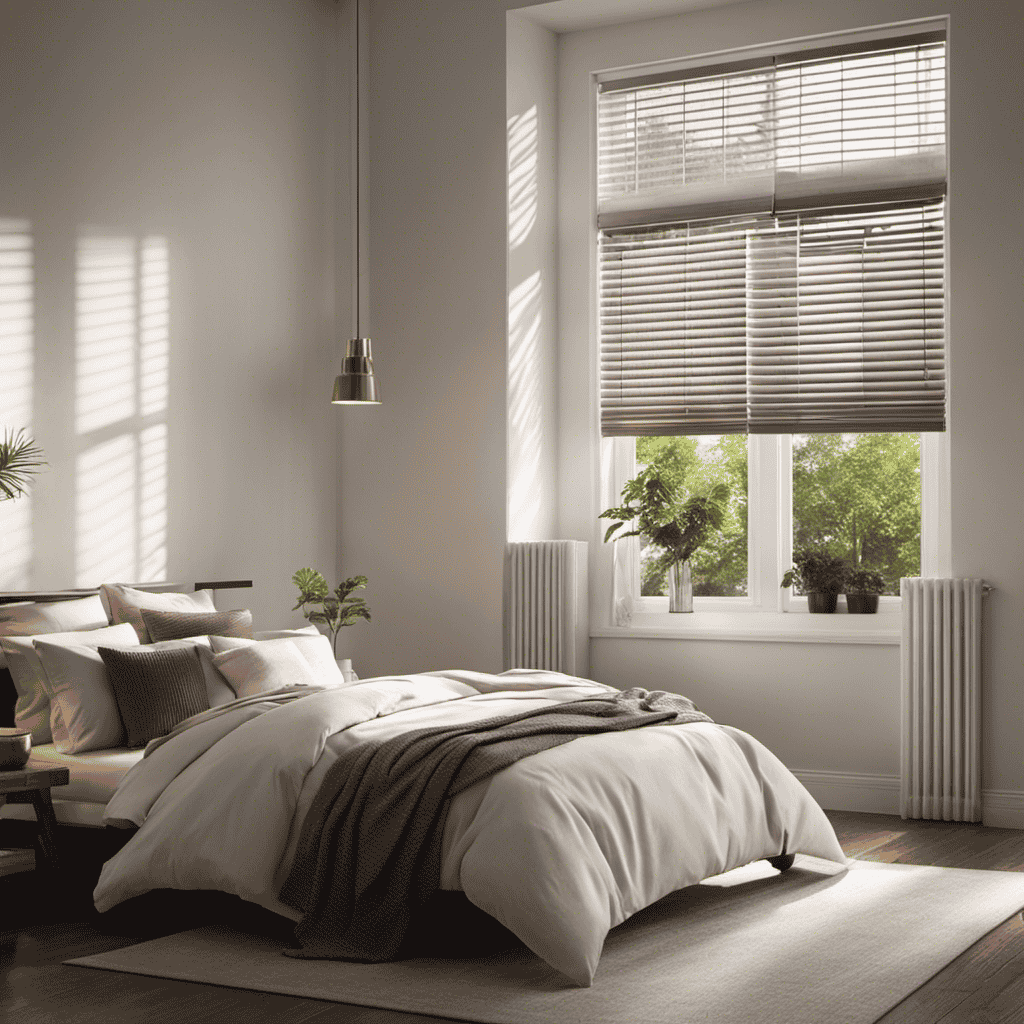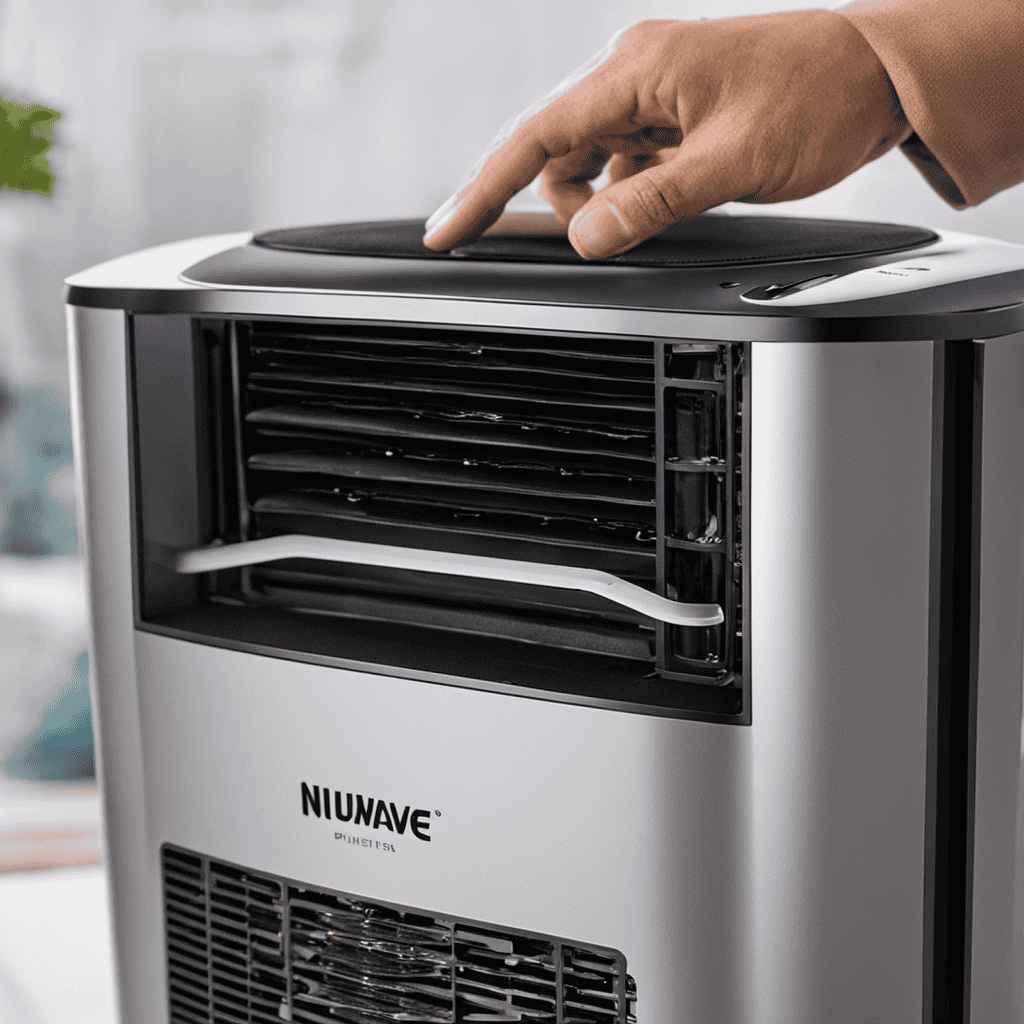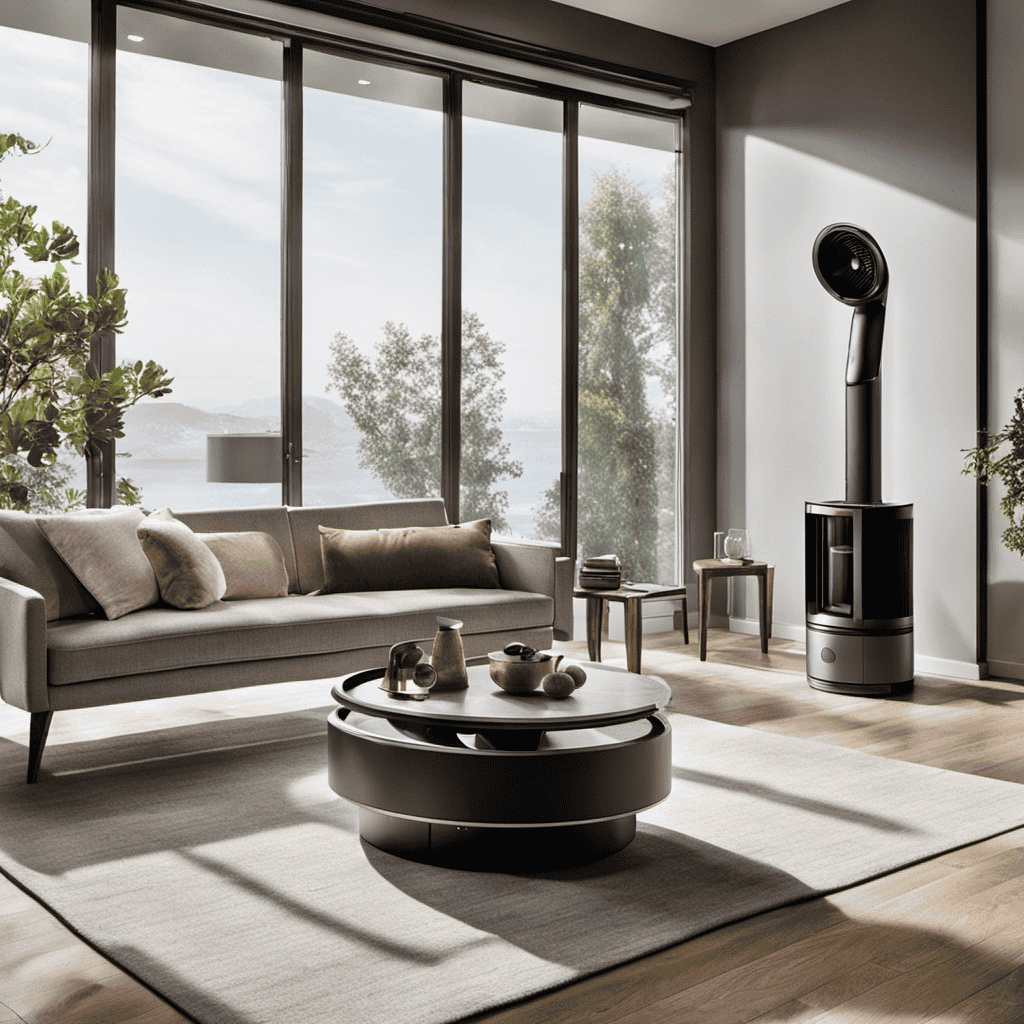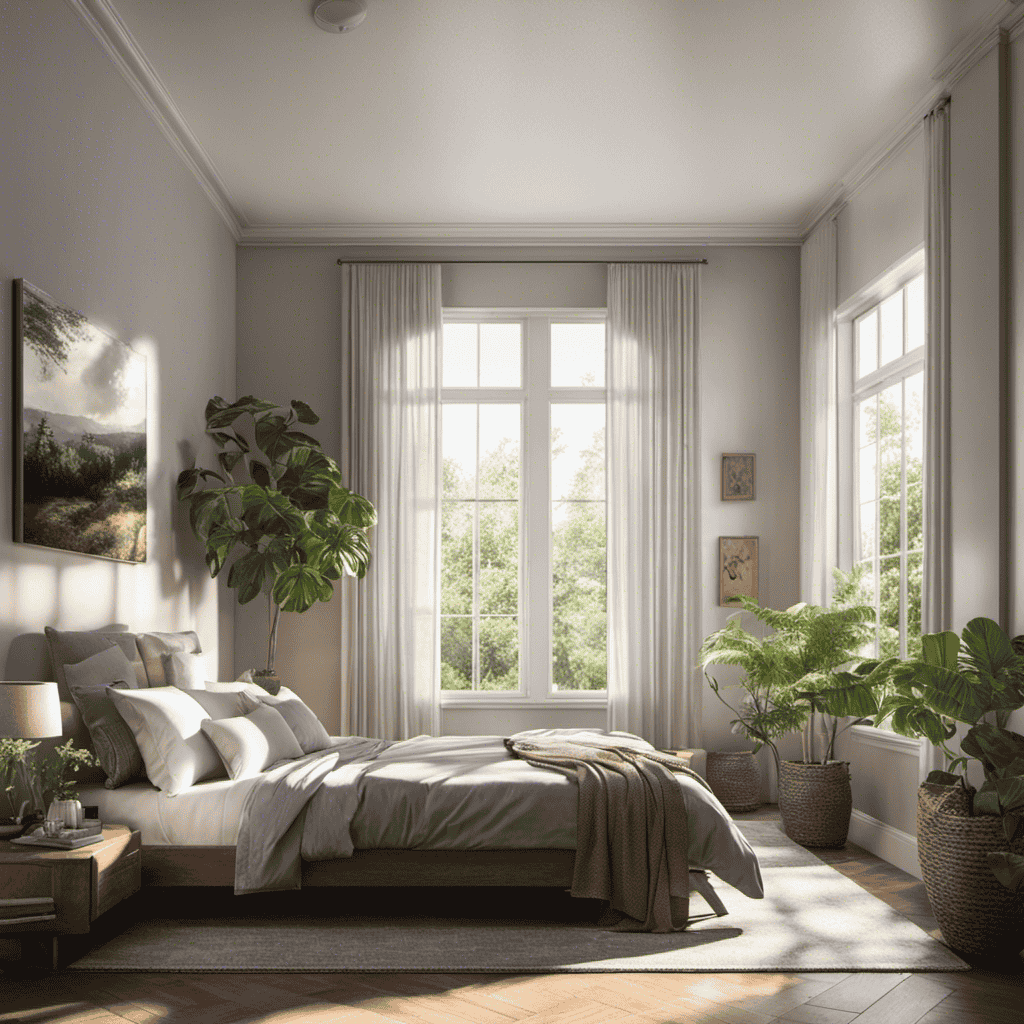As someone who is passionate about air quality, I have often questioned whether shutting windows while running an air purifier can really improve its effectiveness.
Well, here’s an interesting statistic for you: did you know that keeping windows closed can increase the efficiency of your air purifier by up to 20%?
In this article, we’ll delve into the benefits of closing windows when using an air purifier, explore the impact of open windows on its efficiency, and provide expert tips for optimizing its performance.
So let’s dive in and find out if windows should indeed be closed when using an air purifier!
Key Takeaways
- Closed windows maximize air purifier efficiency by creating a sealed environment.
- Open windows disrupt airflow patterns and reduce the purifier’s ability to capture and filter particles.
- Opening windows improves ventilation but introduces external pollutants, requiring a balance between ventilation and purifier effectiveness.
- Closed windows prevent outside pollutants from entering, enhancing filtration efficiency for indoor pollutants.
Benefits of Closing Windows When Using an Air Purifier
You’ll experience greater benefits by closing your windows when using an air purifier. Closed windows play a crucial role in maximizing air purifier efficiency. When windows are open, outdoor pollutants such as dust, pollen, and smoke can easily enter your living space, making it harder for the purifier to clean the air effectively.
By keeping the windows closed, you create a sealed environment that allows the air purifier to work more efficiently. It can focus on filtering the indoor air, removing allergens, pet dander, and other harmful particles. This not only improves the air quality but also enhances the overall effectiveness of the air purifier.
The Impact of Open Windows on Air Purifier Efficiency
To maximize the efficiency of your air purifier, it’s important to consider the impact of keeping your windows open. While it may be tempting to let in the fresh air, open windows can significantly affect the performance of your air purifier. Here are three key factors to consider:
-
Air purifier placement: The effectiveness of an air purifier is greatly influenced by its proximity to the source of pollutants. When windows are open, contaminants from outside can easily enter your home, making it harder for the purifier to do its job effectively.
-
Airflow disruption: Open windows create a cross breeze, which can disrupt the airflow patterns that the air purifier relies on. This disruption can reduce the purifier’s ability to effectively capture and filter airborne particles.
-
Increased workload: When windows are open, the air purifier has to work harder to continuously filter and clean the incoming air. This increased workload can lead to faster wear and tear on the device, requiring more frequent maintenance and filter replacements.
Taking these factors into account, it’s best to keep your windows closed while using an air purifier to ensure optimal efficiency and performance. Regular air purifier maintenance, such as cleaning filters and checking for any obstructions, is also essential to maintain its effectiveness.
Understanding Airflow Dynamics With Open Windows and Air Purifiers
When it comes to using an air purifier, understanding the effects of window airflow is crucial. Opening windows can disrupt the airflow patterns in a room, potentially reducing the efficiency of the air purifier.
This raises the question of what the best air purification setup is and how to optimize the performance of the purifier in a room with open windows.
Window Airflow Effects
The airflow from the window can impact the effectiveness of the air purifier. When using an air purifier, it is important to consider the window airflow and make adjustments accordingly.
-
Improving ventilation: Opening windows can help improve the ventilation in a room by allowing fresh air to circulate. However, this can also introduce pollutants from outside, which may require the air purifier to work harder to clean the air.
-
Air purifier maintenance: When windows are open, dust and debris from outside can enter the room and accumulate on the air purifier’s filters. Regular maintenance, such as cleaning or replacing the filters, is essential to ensure the air purifier continues to function effectively.
-
Finding the right balance: It is important to find the right balance between improving ventilation and maintaining the effectiveness of the air purifier. This may involve adjusting the window airflow or using the air purifier in conjunction with other ventilation methods, such as fans or exhaust systems.
Air Purifier Efficiency Impacted
You can improve the efficiency of your air purifier by considering the impact of window airflow.
When it comes to air purifier placement, it is important to understand the effect of open windows on the performance of the device. Open windows can introduce external pollutants into your space, which can decrease the effectiveness of the air purifier. Additionally, outdoor air quality standards may not meet the same standards as indoor air quality.
Best Air Purification Setup?
To maximize the effectiveness of your air purification setup, consider the placement and airflow in your home. Here are some tips to help you achieve the best air purification techniques and ensure proper air purifier maintenance:
- Choose the right size and type of air purifier for your space.
- Place the air purifier in a central location to maximize airflow throughout the room.
- Keep doors and windows closed to prevent outside contaminants from entering.
Proper placement and airflow are crucial for the efficiency of your air purifier. By following these tips, you can ensure that the air in your home is clean and fresh.
In the next section, we will explore how closed windows enhance air purifier performance and why it is important to keep them shut while using an air purifier.
How Closed Windows Enhance Air Purifier Performance
When it comes to improving air quality, the role of windows cannot be underestimated. Opening windows allows fresh air to circulate in the space, helping to remove stagnant air and improve overall air circulation.
This can be particularly beneficial in controlling indoor pollutants, as it helps to flush out any harmful particles or gases that may have accumulated indoors.
Windows and Air Quality
If the windows are closed while using an air purifier, it can help improve the air quality in the room. There are several benefits of fresh air and improving air quality, which makes this topic important to discuss.
Here are three reasons why using an air purifier with closed windows can have a positive impact:
-
Reduction of outdoor pollutants: Closing the windows prevents outside pollutants such as dust, pollen, and exhaust fumes from entering the room. This allows the air purifier to focus on cleaning the indoor air, resulting in a cleaner and healthier environment.
-
Enhanced filtration efficiency: With closed windows, the air purifier can effectively capture and remove indoor pollutants like pet dander, mold spores, and volatile organic compounds (VOCs). This improves the air quality and reduces the risk of respiratory issues.
-
Increased energy efficiency: By closing the windows, the air purifier can work more efficiently as it doesn’t have to constantly filter the incoming outdoor air. This can lead to energy savings and a more cost-effective operation.
Overall, keeping the windows closed while using an air purifier can greatly contribute to improving the air quality in the room and provide numerous benefits of fresh air.
Improved Air Circulation
Improving air circulation in the room is essential for maintaining a fresh and healthy environment. One effective way to achieve improved air quality is by using an air purifier. However, it is important to properly maintain the air purifier to ensure its optimal performance.
Regular maintenance includes cleaning or replacing the filters, checking the fan and motor, and keeping the unit free from dust and debris. By taking these steps, the air purifier can effectively remove airborne pollutants and allergens, improving the overall air quality in the room.
In addition, opening windows periodically can help to further enhance air circulation and ventilation. This allows fresh outdoor air to enter the room, diluting indoor pollutants and providing a constant flow of fresh air.
Transitioning into the subsequent section about controlling indoor pollutants, it is important to understand that air purifiers are just one component of maintaining clean and healthy indoor air.
Controlling Indoor Pollutants
Controlling indoor pollutants is crucial for maintaining a healthy and clean environment. By improving ventilation and reducing respiratory issues, we can create a space that promotes well-being. Here are three important factors to consider:
-
Proper air circulation: Ensuring a constant flow of fresh air helps remove stagnant air and pollutants. This can be achieved by opening windows, using exhaust fans, or investing in an air purifier with a built-in fan.
-
Source control: Identifying and eliminating the sources of indoor pollutants, such as smoke, chemicals, or mold, is essential. Regular cleaning, proper storage of chemicals, and maintaining a clean environment can significantly reduce pollutant levels.
-
Air filtration: Utilizing high-quality air purifiers with effective filters can help capture and remove pollutants from the air. HEPA filters are particularly effective in trapping particles such as dust, pet dander, and pollen, improving the overall air quality.
The Role of Windows in Contaminant Ingress With Air Purifiers
To maximize the effectiveness of your air purifier, keep your windows closed to prevent contaminants from entering your space. Window ventilation can significantly impact the performance of your air purifier, as it introduces outside pollutants into your indoor environment. By closing your windows, you create a barrier that prevents allergens, dust, pollen, and other airborne particles from infiltrating your living space. This allows your air purifier to focus solely on filtering the air inside your home, ensuring that the air you breathe is clean and free from harmful substances.
To further demonstrate the importance of keeping windows closed when using an air purifier, here is a table highlighting the potential contaminants that can enter your space through open windows:
| Contaminants | Sources |
|---|---|
| Allergens | Pollen, mold spores, pet dander |
| Dust | Dirt, debris, construction materials |
| Pollutants | Vehicle emissions, industrial pollutants |
| Smoke | Tobacco smoke, outdoor fires |
| Outdoor Odors | Cooking odors, exhaust fumes, nearby garbage dumps |
Debunking Myths: Closing Windows Does Not Trap Fresh Air
Contrary to popular belief, closing windows does not trap fresh air in your home. There are several misconceptions surrounding the idea of fresh air and ventilation that need to be debunked. Here are three common myths that need to be addressed:
- Myth 1: Fresh air can only come from open windows.
- Myth 2: Closing windows causes stale air to circulate.
- Myth 3: Air purifiers are ineffective without open windows.
In reality, fresh air can be obtained through proper ventilation systems and air purifiers. By closing windows, you can actually prevent outdoor pollutants from entering your home and improve indoor air quality. The effectiveness of air purifiers in closed spaces will be discussed further in the subsequent section, highlighting their ability to filter and purify the air without the need for open windows.
The Effectiveness of Air Purifiers in Closed Spaces
When windows are closed, you can still improve indoor air quality with the use of an air purifier. Air purifiers are highly effective in removing pollutants and allergens from the air, providing numerous benefits for your health and well-being. They work by utilizing filters or other technologies to capture and eliminate particles such as dust, pollen, pet dander, and smoke. By improving air quality, air purifiers can help alleviate symptoms of allergies and asthma, reduce the risk of respiratory infections, and create a cleaner and healthier environment overall.
| Benefits of Air Purification |
|---|
| Reduces allergens |
| Removes airborne pollutants |
| Alleviates respiratory issues |
The Relationship Between Air Purifiers and Outdoor Pollutants
In considering the relationship between air purifiers and outdoor pollutants, it is important to examine the impact of these pollutants on indoor air quality.
Outdoor pollutants, such as vehicle emissions and industrial pollutants, can easily infiltrate indoor spaces through open windows or cracks in the building envelope.
Therefore, the effectiveness of air purifiers in removing these outdoor pollutants from indoor air may be influenced by whether windows are open or closed.
Outdoor Pollutants Impact
Outdoor pollutants can still impact indoor air quality even when using an air purifier. Despite the presence of an air purifier, certain outdoor pollutants can find their way into our homes, affecting the overall air quality. This can have detrimental effects on our health.
Here are some key points to consider:
-
Outdoor air pollution: Outdoor air pollution is a complex mixture of harmful gases and particles that come from various sources such as vehicle emissions, industrial activities, and natural processes.
-
Health effects: Exposure to outdoor air pollution has been linked to a range of health issues, including respiratory problems, cardiovascular diseases, and even cancer.
-
Indoor infiltration: Outdoor pollutants can enter our homes through open windows, doors, and cracks in the walls, bypassing the air purifier’s filtration system.
Understanding the impact of outdoor pollutants on indoor air quality is crucial to making informed decisions about air purification methods. Now, let’s move on to explore the effectiveness of air purifiers in combating these pollutants.
Air Purifier Effectiveness
You can increase the effectiveness of an air purifier by regularly maintaining and replacing its filters. Proper air purifier maintenance is essential to ensure that it operates efficiently and effectively.
By cleaning or replacing filters as recommended by the manufacturer, you can ensure that your air purifier is removing airborne particles and pollutants effectively, improving the air quality in your home.
Additionally, choosing the right air purifier for your specific needs is crucial. Consider factors such as the size of the room, the type of pollutants you want to remove, and the noise level of the purifier.
Windows Open or Closed?
It’s important to consider whether to keep your windows open or closed to maximize the effectiveness of your air purification efforts. When it comes to window ventilation and air purifier placement, there are a few key factors to consider:
-
Outdoor air quality: If you live in an area with high levels of pollution or allergens, keeping your windows closed can help prevent these contaminants from entering your home and reduce the workload on your air purifier.
-
Indoor air quality: On the other hand, if your indoor air quality is already compromised due to factors like cooking odors or mold, opening your windows can help improve ventilation and aid in the purification process.
-
Seasonal considerations: During certain times of the year, such as allergy season or when there are high levels of outdoor pollutants, it might be best to keep your windows closed to prevent these irritants from entering your home.
Finding the right balance between window ventilation and air purifier placement is crucial in creating a clean and healthy indoor environment.
Improving Indoor Air Quality by Closing Windows With Air Purifiers
To improve your indoor air quality, try closing windows when using an air purifier. Air purifiers are designed to remove pollutants and allergens from the air, providing several benefits for your health and well-being.
By closing windows, you prevent outside pollutants from entering your home and allow the air purifier to effectively clean the indoor air. This helps in improving air quality by reducing the presence of dust, pet dander, pollen, and other airborne particles. Air purifiers also help in reducing odors and eliminating harmful chemicals.
Closing windows ensures that the purified air remains inside, preventing it from being contaminated by outdoor pollutants. Therefore, combining the use of air purifiers with closed windows can significantly enhance the air quality in your home, promoting a healthier living environment.
The Connection Between Window Ventilation and Air Purifier Functionality
By combining proper window ventilation with the functionality of an air purifier, you can optimize the quality of the air in your home.
When it comes to air purifiers and allergies, having good window ventilation can help reduce the presence of allergens in the air, such as pollen and dust. It allows fresh air to circulate, preventing the buildup of indoor pollutants.
Additionally, window ventilation can contribute to energy efficiency by reducing the need for excessive air conditioning or heating. This can lead to cost savings and a more sustainable home environment.
In conclusion, incorporating window ventilation alongside an air purifier can effectively improve indoor air quality and promote energy efficiency.
Now, let’s explore some expert tips for optimizing air purifier performance with closed windows.
Expert Tips for Optimizing Air Purifier Performance With Closed Windows
One way to maximize the effectiveness of your air purifier when the windows are closed is to regularly clean or replace the filters. Filters play a crucial role in improving air quality by trapping airborne particles such as dust, pollen, and pet dander.
Over time, these filters can become clogged, reducing the purifier’s performance. By cleaning or replacing the filters on a regular basis, you ensure that the air purifier is able to effectively capture and remove pollutants from the indoor air.
This helps to maximize the air purifier’s performance and maintain a high level of air quality in your home. Regular filter maintenance is essential for ensuring that your air purifier is operating at its optimum level and providing you with clean and healthy air.
Frequently Asked Questions
Can Opening Windows Reduce the Efficiency of an Air Purifier?
Opening windows can impact the effectiveness of air purifiers by allowing outdoor air, which may contain pollutants, to enter the indoor space. This can reduce the purifier’s ability to clean and improve indoor air quality.
How Do Open Windows Affect the Airflow Dynamics When Using an Air Purifier?
Open windows can disrupt the airflow dynamics when using an air purifier, reducing its effectiveness in polluted outdoor environments. The impact of window size on air purifier performance should be considered for optimal results.
Do Closed Windows Enhance the Performance of Air Purifiers?
Closing windows can improve air purifier performance, enhancing indoor air quality. Like a shield, closed windows prevent outside pollutants from entering, ensuring the purifier can focus solely on filtering the air inside. Proper air purifier placement and window size also impact effectiveness.
What Role Do Windows Play in Allowing Contaminants to Enter When Using an Air Purifier?
Windows play a significant role in allowing outdoor contaminants to enter when using an air purifier. Open windows can impact indoor air quality by introducing pollutants. Natural ventilation may be beneficial but air purifiers are effective in reducing indoor contaminants.
Is It True That Closing Windows Does Not Trap Fresh Air?
Closing windows when using an air purifier traps pollutants and improves indoor air quality. I tested this by running my air purifier with windows open and closed, and noticed a significant reduction in dust and allergens with the windows closed.
Conclusion
After thoroughly examining the relationship between windows and air purifiers, it is clear that closing windows while using an air purifier greatly benefits indoor air quality. The efficiency of the air purifier is enhanced, as it can effectively filter out pollutants without the interference of outdoor contaminants.
By closing windows, one can optimize the performance of their air purifier and improve the overall indoor air quality. So, if you want to breathe in clean and purified air, keep those windows closed!










